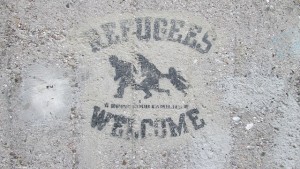Should We Test Refugees and Immigrants?

On one hand, some condemn the rejection of refugees as a lack of compassion while others express hesitation because they believe the plan creates an opportunity for extremists to move in next door. What can be done?
By Russ Warner, VP Marketing & Operations —
What keeps Americans on edge? Bombings in Paris and Brussels, the tragedy of San Bernardino in our backyard, other terrorist attacks around the world, immigration challenges, etc. And the ongoing debates regarding how (and if) to admit refugees and immigrants into the country do not seem to make matters better. Despite differing political opinions about how to manage these issues, when will we take action to make things better?
Take No Refugees
A few lawmakers have pushed back against proposed legislation when it comes to admitting refugees into the country. Texas Governor Greg Abbott expressed frustration. He believes that refugees from countries containing terrorist-controlled territories pose a serious threat to the US. Nearly thirty other governors across the country agreed with Abbott and stated they would prevent refugees from entering their states. The federal government has ignored these objections and continues to resettle Syrian refugees in communities across the country.
This issue is quite a paradox. On one hand, some condemn the rejection of refugees as a lack of compassion while others express hesitation because they believe the plan creates an opportunity for extremists to move in next door. What can be done?
Mandatory Lie Detector Screening
Steve McCraw, Director of the Texas Department of Public Safety, believes that lie detection tests could prove quite valuable in the vetting of Syrian or other refugees. The challenge is that this action has never been taken. But by implementing a screening lie detection test as part of the vetting process for refugees entering the country, there could be a few benefits. First, it could identify terrorists or others with terrorist ties. Second, if refugees knew they will be screened, potential terrorists may refrain from attempting to enter the country this way.
Democratic Texas state representative Richard Peña Raymond supports the idea that using lie detectors should be seriously considered. “I’m willing to bet those two people in California wouldn’t have wanted to take the polygraph,” he argues.
Many law enforcement agencies require job applicants to pass a polygraph exam as part of the hiring process. If we require law enforcement personnel to pass a lie detector test, why shouldn’t we also screen potentially dangerous refugees? Granted the number of potential terrorists is low, but even one is too many.
Challenges and Solutions
Critics might say that it would be an impossible and costly task to test tens of thousands of refugees with polygraph. The cost would be high and the time involved would be excessive. However, new technologies have come to market that remove many of these challenges. Some are software-based and that would make them fast, automated, cheap, and more efficient. Software solutions can scale to test tens of thousands while providing immediate test results without bias or discrimination.
Thus far, the federal government has maintained its position that vetting refugees
would be impossible on any grand scale. Critics of a plan to screen refugees would say the risk (low) doesn’t outweigh the cost (high). But how many more terrorist attacks are we willing to allow in the U.S.? With new technologies, there is not a strong argument against taking action.
The Cost of Taking Action
New lie detection technologies can help protect citizens against potential terrorist acts while allowing refugees to get the relief they are desperate to find. This relief does have a price tag. But if we are willing to support and assist with education, health care, and welfare programs, why not spend on violence prevention?
America is known for its high regard for life, liberty, and freedom. We have always had helping hands to assist when others struggle. Democratic Texas state representative Elliott Naishtat said regarding Syrian refugees, “They’re not coming here to get welfare assistance. They’re leaving [their homelands] because they have no choice.”
It makes sense to leverage the use of technology to identify those in true need and those who intend to do harm. By implementing a screening tool into the refugee screening process, the federal government can identify extremists and protect our borders while maintaining the values on which the country was founded.
Sources
National Review
Fox News
Converus
Photo courtesy of walterw.a.

